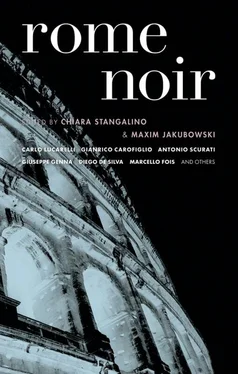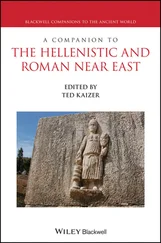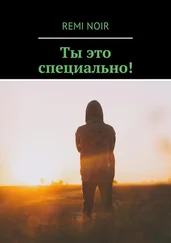Джанрико Карофильо - Rome Noir
Здесь есть возможность читать онлайн «Джанрико Карофильо - Rome Noir» весь текст электронной книги совершенно бесплатно (целиком полную версию без сокращений). В некоторых случаях можно слушать аудио, скачать через торрент в формате fb2 и присутствует краткое содержание. Город: New York, Год выпуска: 2009, ISBN: 2009, Издательство: Akashic Books, Жанр: Детектив, на английском языке. Описание произведения, (предисловие) а так же отзывы посетителей доступны на портале библиотеки ЛибКат.
- Название:Rome Noir
- Автор:
- Издательство:Akashic Books
- Жанр:
- Год:2009
- Город:New York
- ISBN:978-1-933354-64-4
- Рейтинг книги:3 / 5. Голосов: 1
-
Избранное:Добавить в избранное
- Отзывы:
-
Ваша оценка:
- 60
- 1
- 2
- 3
- 4
- 5
Rome Noir: краткое содержание, описание и аннотация
Предлагаем к чтению аннотацию, описание, краткое содержание или предисловие (зависит от того, что написал сам автор книги «Rome Noir»). Если вы не нашли необходимую информацию о книге — напишите в комментариях, мы постараемся отыскать её.
Rome Noir — читать онлайн бесплатно полную книгу (весь текст) целиком
Ниже представлен текст книги, разбитый по страницам. Система сохранения места последней прочитанной страницы, позволяет с удобством читать онлайн бесплатно книгу «Rome Noir», без необходимости каждый раз заново искать на чём Вы остановились. Поставьте закладку, и сможете в любой момент перейти на страницу, на которой закончили чтение.
Интервал:
Закладка:
“Iu-gu-la. Iu-gu-la. Iu-gu-la.”
Once again the cry broke the silence. The people had decided.
Even before the Emperor, coming down from his dais surrounded by vestal virgins, turned his thumb down, the defeated gladiator moved. Advancing on his knees, he clasped his hands around the victor’s legs. Then he bowed deeply and, with exasperating slowness, bent his head forward. As soon as the head’s arc reached the end of its course, the victor, gripping the knife with both hands, plunged it straight into the victim’s neck. Up to the hilt.
“Ha-bet, hoc ha-bet!”
From the stands, a howl like thunder greeted the death.
“What does iugula mean?”
One of the two presumed CIA agents, the male, approached the bed from which the man attached to the drip and the electrocardiograph had just finished describing his vision. His name was John Dukakis, and he was a forty-three-year-old former soldier, who had joined the Army after his college education was paid for by ROTC scholarships; he was a veteran of the two Persian Gulf wars, and a native of Medina, a town in the western part of New York State.
Agent Stone waited for the man’s reply in a room in a mysterious, small underground hospital connected to the U.S. embassy, on Via Veneto. Dukakis had been transported there after he fainted. Now, after he had been given the necessary care, and the medical personnel had been dismissed, he was being questioned. The only other people in the room, besides the two CIA agents, were the Army officer who had been present at the San Camillo hospital, Angelo Perosino, and an artist who specialized in sketching storyboards for film directors at Cinecittà, that Hollywood on the Tiber where all the great Italian films had been produced in the ’50s and ’60s by the likes of Fellini, Visconti, Rossellini, and De Sica. The artist was busily translating into images the story he had just heard from Dukakis, but the former soldier seemed to have nothing further to add.
“What does iugula mean?” Agent Stone repeated.
“I don’t know,” Dukakis said finally. “I only speak English. Those fiends in the stands were shouting it as though possessed.” Then he turned his head away, swallowed with difficulty, and half-closed his eyes.
“It means sgozzalo , ‘cut his throat.’” Perosino chimed in. “The public at the gladiatorial contests shouted it when they wanted to demand the death of one of the two combatants.”
“And that cry at the end?” the agent inquired further.
“ Habet, hoc habet ?”
“Yes, that one.”
“It means ‘He got it.’ It refers to the sword thrust into his neck. The people shouted it when the defeated man ‘got’ the sword.”
The illustrator had finished. He handed the sheets to the two agents. The woman took them. A series of quick sketches perfectly reconstructed the entire scene that Dukakis had described, alternating long shots and close-ups, as in a film sequence.
The woman gestured to the others to follow her out to the corridor. She shook her head: “He’s a soldier who fought in the front lines, probably suffering from the trauma of a grenade or some variation of post-traumatic stress syndrome, and he must certainly be a fan of action films like Gladiator . The one with Russell Crowe as a Roman general sent to do combat in the arena. He is probably superimposing the film’s images on the scene of the real Colosseum.”
“But Dukakis doesn’t know Latin!” the other agent interrupted.
The woman quashed the objection with a quick hand gesture. Now she gazed severely at Perosino, her blue eyes like ice. It seemed that she would not allow her hypothesis to be proven wrong.
Perosino regretted having to do so: “I’m sorry to contradict you, but that’s not possible. The patient’s account is much more faithful to the historic reality than the film is. In a number of details. Even if you ignore the issue of Latin, Dukakis’s description of the death ritual does not appear in the film and his details about the equipment are much more accurate. For one thing, Russell Crowe, in the role of Maximus, appears in the arena with armor that was worn not by gladiators but by soldiers of the Roman legions. The gladiators in Dukakis’s vision, on the other hand, fought bare-chested, as they did in actuality—”
“Then you, too, Professor Perosino,” Agent Stone interrupted “believe that these subjects have ‘seen’ the past?”
Little by little, as the conversation continued, Agent Stone was assuming an increasingly animated air. He stared off into space as he spoke, as if he were expecting at any moment to be visited himself by one of those visions.
Perosino began to feel anxious. Though compelled to say that Stone was right, deep inside he sympathized with the skeptical position taken by Agent Miller. He decided that it was his turn to ask questions. “Do you think that what we have here are cases of ‘remote viewing’?” he asked point-blank.
“Our driver will accompany you back to the university. The agreed-upon sum will be credited to your bank account. You have been a great help to us. Good day, Professor Perosino,” Agent Miller said as she moved off down the corridor. Agent Stone followed her without another word.
III
“It’s happened again.”
Angelo Perosino looked up from his Negroni. Standing in front of him in his Armani suit, Agent Stone stared at him from behind the shield of his inevitable sunglasses. Once again Perosino took offense. He had always gauged the meagerness of his salary as a university researcher by the cost of an Armani suit. It would take a month’s pay for one to buy an Armani suit. But only on sale at the end of the season . This is what Angelo Perosino thought whenever he felt discouraged about his work, and this is what he thought now when Agent Stone appeared before him.
“Have something. Can I offer you an apéritif, Agent Stone?” He spoke as though defying poverty. His own poverty.
Stone looked around. They were at Café Fandango in Piazza di Pietra, in the very heart of Rome, behind the Pantheon and opposite an impressive colonnade that once marked the boundary of a pagan temple but had later been incorporated into a structure less than a thousand years old. Café Fandango, owned by a successful independent producer, was frequented by writers and film people. Perosino went there often, hoping to be able to market one of his many stories of ancient Rome for a film.
“There’s something you definitely have to see, Professor Perosino.”
Stone was peremptory, as usual. Once again Perosino followed him.
During the drive to the covert hospital attached to the embassy, Stone and Perosino did not speak. Their silence was broken only when the driver deviated from the route and took Via dei Fori Imperiali in order to pass by the Colosseum.
“Do you like the Colosseum, Professor Perosino?” Agent Stone asked, indicating the seven concentric circles of arches that had once been adorned with huge slabs of travertine marble.
“The Colosseum is Rome. I was born here. These are things that happen to you. You don’t have the option of liking or disliking them.”
“You don’t believe that the past can reappear, Professor Perosino?” Agent Stone asked him after a brief pause.
“Rome is the Eternal City, I imagine you’ve heard it said, Agent Stone. When you live in eternity you don’t believe in anything,” Perosino replied.
Yet even as he spoke those words of deliberate cynicism, the researcher, confused by the noise of the traffic, had the momentary impression that he was seeing his city on the night before a spectacle, two thousand years ago. The blaring car horns sounded to him like the infernal din of the carts making their way from the animal parks of the imperial gardens, carrying the beasts toward the inevitable, their sole performance in the arena. Locked in dark cages, they would wait in the underground crypts of the Colosseum, already buried under the earth’s crust.
Читать дальшеИнтервал:
Закладка:
Похожие книги на «Rome Noir»
Представляем Вашему вниманию похожие книги на «Rome Noir» списком для выбора. Мы отобрали схожую по названию и смыслу литературу в надежде предоставить читателям больше вариантов отыскать новые, интересные, ещё непрочитанные произведения.
Обсуждение, отзывы о книге «Rome Noir» и просто собственные мнения читателей. Оставьте ваши комментарии, напишите, что Вы думаете о произведении, его смысле или главных героях. Укажите что конкретно понравилось, а что нет, и почему Вы так считаете.












